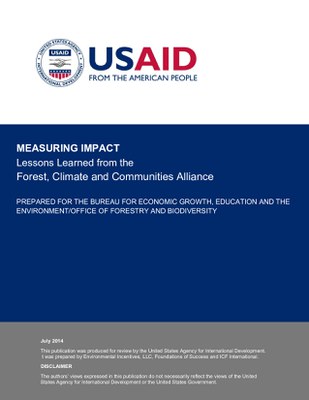Measuring Impact: Lessons Learned from the Forest, Climate and Communities Alliance

The Forest, Climate, and Communities Alliance (FCCA) was an initiative funded by USAID’s Bureau for Economic Growth, Education, and the Environment/Office of Forestry and Biodiversity (E3/FAB) under the USAID Global Development Alliance (GDA) between 2009 and 2013. FCCA was one of the first USAID-funded projects for reducing emissions from deforestation and degradation (REDD+). The Rainforest Alliance (RA) implemented FCCA in Ghana and Honduras.
Information relevant to Learning Questions:
Are enabling conditions in place to support a sustainable enterprise?
- Stakeholder alignment, diversification
- Market demand, access to credit/capital
- Governance
- Government requirements, policies for enterprises, business alliances
- Financial management capacity, technical capacity
- Inputs, equipment, infrastructure
- Benefit sharing, targeted participants, combined strategic approaches, biodiversity linkage, policies for and enforcement of resource use, external disturbance
Does the enterprise lead to benefits to stakeholders?
- Increased income for participants
- Non-cash benefits
Do the benefits lead to positive changes in attitudes and behavior?
- Not addressed
Does a change in stakeholders’ behaviors lead to a reduction to threats to biodiversity (or restoration)?
- Agriculture and aquaculture
- Biological resource use
- Human intrusions and disturbance
- Climate change and severe weather
Does a reduction in threats (or restoration) lead to conservation?
- Forest ecosystems
- Freshwater ecosystems
- Species
Enterprise Types:
- Crops: cocoa
- Livestock: grasscutter
- Sustainably Harvested timber products
- Non-timber forest products
- Other natural products: beekeeping
Document type
- Case-study
- Report

